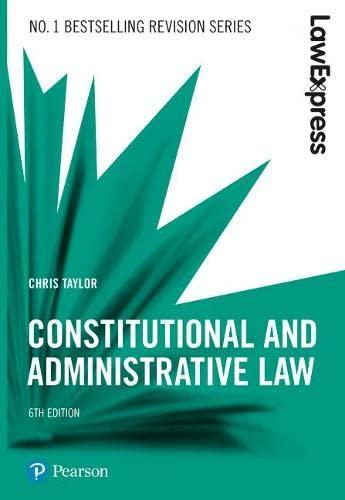Question
Help me here : Link below will help : https://www.washingtonpost.com/business/2020/07/24/faq-federal-eviction-moratorium/ https://www.nolo.com/evictions-ban https://www.brookings.edu/blog/up-front/2020/09/21/an-eviction-moratorium-without-rental-assistance-hurts-smaller-landlords-too/ https://www.marketwatch.com/story/landlords-sue-cdc-trump-administration-over-unconstitutional-national-eviction-moratorium-2020-09-23 https://www.nytimes.com/2020/09/02/your-money/eviction-moratorium-covid.html The Covid-19 pandemic has caused an unprecedented disruption of the residential
Help me here : Link below will help :
https://www.washingtonpost.com/business/2020/07/24/faq-federal-eviction-moratorium/
https://www.nolo.com/evictions-ban
https://www.brookings.edu/blog/up-front/2020/09/21/an-eviction-moratorium-without-rental-assistance-hurts-smaller-landlords-too/
https://www.marketwatch.com/story/landlords-sue-cdc-trump-administration-over-unconstitutional-national-eviction-moratorium-2020-09-23
https://www.nytimes.com/2020/09/02/your-money/eviction-moratorium-covid.html
The Covid-19 pandemic has caused an unprecedented disruption of the residential real estate market. Lock-down orders and stay- at-home mandates have left hundreds of millions of Americans confined to their homes. At the same time, widespread shutdown of the economy has caused unemployment at rates never seen since the Great Depression. This has left tens of millions of Americans in an intractable position- they are unable to leave their homes but are prohibited from earning money to pay their rent.
The Coronavirus Aid, Relief , and Economic Security Act (the CARES Act) barred evictions for nonpayment of rent in most circumstances for federally subsidized or other federal rent programs. However, this stay involved only about 1/3 of the nation's 108 million residential leases. The stay was subsequently replaced by an executive order. States and various municipalities have tried to address this situation by enacting broad moratoriums on eviction proceedings . However, these prohibitions were a temporary respite and left additional problems. Most orders specified that merely the formal eviction procedure, called a forcible detainer action in most states, was or has been prohibited. Most of these ordinances specifically did not obviate rent obligations. For most tenants, despite the moratorium their rent debts continued to accrue .
Starting in February 2020 and continuing in the following months, unemployment rates soared. Rental obligations remained unpaid and overdue balances skyrocketed. Landlords bemoaned the moral hazard of nonpayment encouraged by the moratoriums. For most families that lived paycheck to paycheck, the resultant several months in unpaid rent obligations were a financial obstacle that could never be overcome, even in the best of economic times.
The public policy of handling residential rental evictions during a pandemic also presents an unusual ethics quandary . Suspending eviction actions stopped an immediate intolerable issue- that of individuals and families being displaced during the crisis. But it created a cascade of other potential problems .
For smaller , noncorporate landlords (as well as heavily leveraged larger property owners ), the eviction moratorium and increases in nonpayment immediately shifted the burden to them. Mortgages went unpaid . Smaller landlords and retirees on fixed incomes who depended on their rental income faced immediate financial devastation . As the pandemic continued and moratoriums remained in place for month upon month , unpaid rental bills mounted . Landlords who had leveraged properties saw their equity evaporate . Many began to argue that the moratoriums had , rather than prevent a loss , merely shifted losses from the pandemic .
Furthermore, at some point the moratoriums will eventually end. The societal and economic impacts of the expected flood of evictions that will likely follow are unprecedented and unknown.
In your response, you should consider some of the following questions :
What should a landlord do for nonpaying tenants in a time of pandemic? What obligations, if any, do tenants owe to their landlords?
And who should bear the cost of this small part of the pandemic disaster? To the extent that policy choices can assign this loss to one group or another , who should make those policy choices ? What factors should go into making these decisions ? What ethical concerns should be weighed in making these policy choices ? If eviction moratoriums are appropriate , who should decide when to impose them ? When you eviction moratoriums end? How do we tell?
In drafting your response, please mention any examples or instances that would support either side of the issue or that you believe should have been handled differently . Feel free to google the issue or bring outside resources into your response. Please cite any sources in your preferred citation format. Your answer should clearly state your opinion on the issue and why you reached your conclusion . Submit your answer through blackboard .
Your initial posting of at least 300 words is due by Thursday of the module week. You should also make at least two subsequent response post points of at least 200 words by Sunday of the module week.
Some articles on the issue are below. Note that this is a fast- changing situation and you may want to seek more current sources than those available now. There are numerous views on the issue and you are encouraged to consider them and explore for your own ideas . However , you must cite any source you rely upon and attribute all sources.
Step by Step Solution
There are 3 Steps involved in it
Step: 1

Get Instant Access to Expert-Tailored Solutions
See step-by-step solutions with expert insights and AI powered tools for academic success
Step: 2

Step: 3

Ace Your Homework with AI
Get the answers you need in no time with our AI-driven, step-by-step assistance
Get Started


